Tiny, bloody aliens bursting out of chests have been iconic in pop culture for more than 30 years. This experience has irrevocably shaped the face of science fiction aliens, making celebrities out of monsters. The Alien franchise has since been continued on through 3 sequels, 2 prequels, and 2 crossover films. It has become deep-seeded into our cinematic culture. However, the films have not all been cohesive in message, style, or form.
Recently, though, a fascinating cycle has occurred within the series as Ridley Scott, the director of the original Alien, has come back into the fold to direct the past two prequels of the franchise. Scott has been quoted to have serious regrets leaving the Alien films, and it can be inferred that he intends to have the story go more the route he expected, instead of the way it went.
So how did the films go? What has happened in this franchise and what led to its devolution and now resurrection? Also, what signs were there in the original film that clued towards Ridley Scott’s route that’s progressing instead of the route it went? And what signs led it elsewhere?
I intend to dissect the motifs and themes of each film and how they worked as movies to explore the journey of the franchise and the differences between what it became, what it could have been, and what that may mean for the future of the movies. Alien has been close to my heart since I saw my first chestburster tear itself through John Hurt’s ribcage, and analyzing the films can lead to serious insight into the themes of sci-fi movies, directorial influence, and how they fit together.
So let’s begin with the OG Nostromo itself.
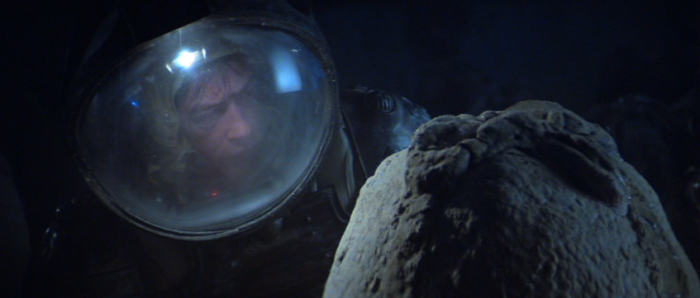
In 1979, Ridley Scott debuted his isolationism sci-fi horror film Alien that rocked a genre. It became a movie classic and skyrocketed the xenomorph and Ellen Ripley (Sigourney Weaver) to iconic status. To briefly overview the plot, the crew is on a trip to commercially move cargo, but is woken up from stasis by an odd transmission from an odd planet. They go to check it out, Kane (John Hurt) gets impregnated by a facehugger, a baby xenomorph bursts out of his chest, and the horror has only just begun as the crew tries to survive and escape. Now, what themes become prevalent? Well, there’s always been a vein of creations killing creators in these movies, especially in Scott’s films, and this one isn’t as explicit but it’s definitely there. It’s not coincidental that the facehugger has parts that look like sex organs, or that the xenomorphs burst out of chests like a very painful, gory birth. Also, its no mistake that Ash, an android who has a directive not to ever hurt humans, has superseded that for the order to bring the alien back and is willing to kill humans for this “perfect organism,” even though humans are his creators. This kind of thinking is further expanded in Prometheus and Alien: Covenant, but is more or less dropped in the sequel films. Its subtle there, but never quite that important again. Yet, how can such an important vein in the first film get dropped? This is where things go down an interesting road. In this film, there is also the computer which is called “Mother.” Mother gives information, but also hides secrets so starts out helpful and “motherly” but turns out to be geared toward company gains first, not helping protect the crew first. This ties in with Scott’s cycle of creator creates creature/situation, but the situation/creature turns on them. Because ultimately, Ripley turns on Mother as well and blows up the Nostromo. No person likes to be told they’re expendable. However, the later films changed this creation theme more into two themes instead: a mother theme and an imperialism, “don’t mess with other creatures” theme. Seems subtle, but actually is very different, right? And it all begins with a brilliant, beautiful film called Aliens.
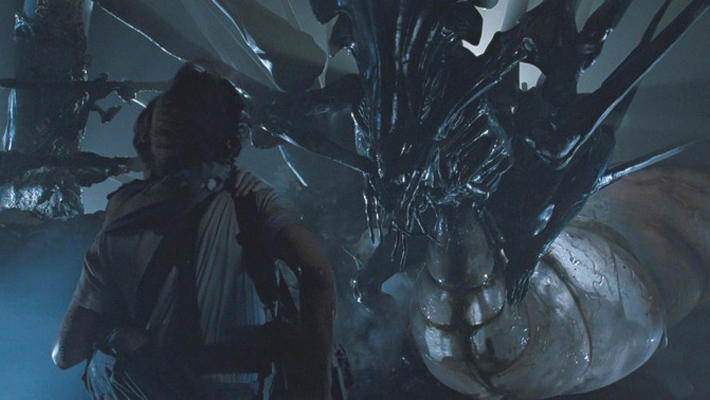
I must admit, I love Aliens. It is my favorite of the group because, regardless of its more simplified themes, it’s a well-made movie and has very good, quotable lines in it. But it also starts working against some of the themes Scott meticulously set up, which is why though it’s brilliant, but it is the beginning of the problems. First, it simplifies the complex creator theme into those “mothers are protective” and “don’t mess with what you shouldn’t” themes. They are fine when done well, which they were, but they did undermine Scott’s original start. The android in this film is extremely likeable, with no conflicts about being subservient to his human counterparts. The film focuses more on the “look what you did, poking into other’s business” aspect of the company’s interest in xenomorphs, less the perfect organism and more scientific edge of the first film. Also, damn me for saying this, no matter how badass Ripley fighting the alien queen is, her whole badass sequence completely destroys the credibility and ferocity of the xenomorph creatures as the perfect destructors of their creators. There is merit, though, to the good it did. It cemented Ripley as a female heroine and did all of its less sci-fi complex themes ridiculously well. The movie knew what it was doing, giving Ripley a child to protect and have the mother face-off of the century. Yet that thematic nuance from Scott died. And, of course, the next two movies only served to rub salt in the wound.
As they are both serious letdowns after the first two films, I’m going to lump Alien 3 and Alien: Resurrection together in this part of the discussion. This is the point where the decisions that James Cameron made to alter the course of the franchise began to crash and burn. Part of it is faulty directorial and script-work, but there is a fair argument in the fact that Cameron’s simplifying of themes made it a hard place to jump off from. Things seemed more tied together and, from where he left it, things were set. The planet blew up. Ripley cemented herself as alpha mother. Unless things got contrived, there was no conflict left. So guess what? Things got contrived.
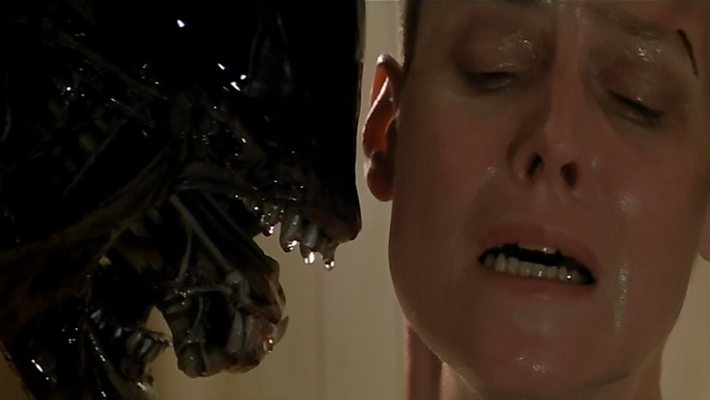
In Alien 3, supposedly the alien mother laid 2 eggs on the ship in the time it took her to hide in the landing gear, fight Ripley, and be sucked out the airlock. One supposedly infected Ripley, and another a dog in the prison complex where she lands. Why prison? I can’t really tell you. My best guess is that they took Bishop’s redeeming androids thread of the last movie and decided to make it the new main theme of this one, having prisoners redeem themselves by depressing self-sacrifice. In a sick, depressing twist, Ripley becomes a host and has to kill herself. The only redeeming part of the movie itself was the awesome exploration of a xenomorph infecting another creature and what would happen, as the dog/xenomorph was amazing to watch in action. The film isn’t great, but it was impressive how hard it tried to kill the franchise, and I can give it credit for that.
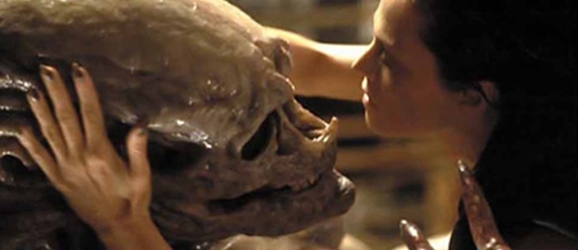
But, horrifyingly, its attempt at film self-sacrifice was in vain. Alien: Resurrection happened. I honestly don’t even know where to start with that one. The film brings the “don’t poke places you shouldn’t” theme back, chastising scientists for trying to control the aliens and clone a dead woman with the film itself creating the disgusting, bastardization of the “newborn.” I still die a little inside because of its existence. The thing with Alien: Resurrection is it took all of Cameron’s themes, but didn’t really know what to do with them. The best spots were taken, so they had to contrive some things to make up conflict and the “correct ingredients.” The Ripley clone room was horrifying and cemented the theme that the scientists were fucking with things they shouldn’t, but why? What did it serve to the overall meaning or plot? Same with the newborn. It didn’t make sense that the aliens who had been bursting out of humans and looking the same over and over suddenly looked like a play-dough snot monster just because it was a little more human DNA. We had no previous reason before to wonder this, yet apparently this movie gave us answers. The whole film honestly is just a huge question mark for me, because none of it needed to happen. Ripley had no arc left. She was dead. The xenomorphs were dead and gone on two different planets now. Unless they started totally fresh with no Ripley and new, updated themes, it was needless. Yet they did it anyway, but at least it was the end of it.
That was until 15 years later when Ridley Scott found himself back at the xenomorph helm, ready to make things his way this time.
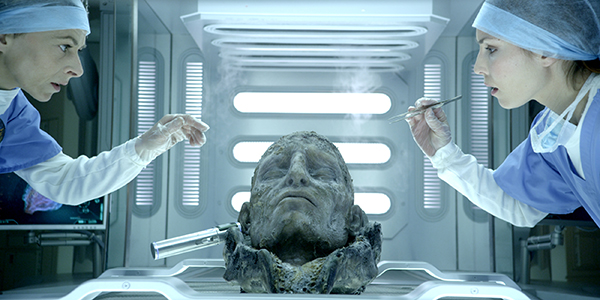
Prometheus was something I felt uncertain about because I’m game to see aliens and, specifically, xenomorphs at all times of the day, but the last two movies had been quite the mess. Luckily, it was not the mess I feared. Prometheus was something else entirely. Don’t worry, I’m not going to go haywire trying to say it’s the best. But unlike the last two, Prometheus had a clear theme and direction. I would in no way call it a perfect film, but it certainly went back to the seeds that were planted in the first film: creations and their creators. It explores the complexities of creation, such as wanting to meet and know your creators, the possibility of being rejected by a creator, or a creation turning on its creator. It’s kind of refreshing to have the movie back to being more about the concept and creatures than the characters. It’s also fascinating how the movie becomes a more classic sci-fi. There are several pillars of sci-fi stories, and one of the most prevalent is the scientist trying to become god and ultimately having it backfire. The creation cycle Scott has cemented in this movie and subsequently Alien: Covenant shows this perfectly.
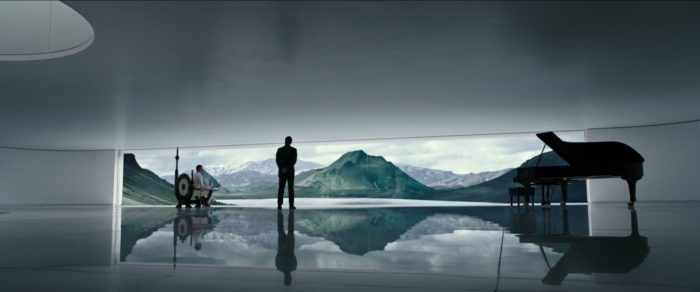
And speaking of Alien: Covenant, it expands upon these ideals even more. Creations becoming creators. Creations killing their creator’s creators. Trying to harness the perfect organism, as a creation-fascinated scientist, which is directly mentioned in the first movie. The movie also expands this concept by showing how the creators’ ideals are put into their creations. Weyland created David and emulated his reverie for art, exploration, and humanity. But David, seeing the destructive nature of humanity as well as its fragility, emulates that in creating a mercilessly destructive creature that is not nearly as fragile as a human being. He saw the imperfections in his creators and wanted to eliminate those things he perceived as flaws. The creation themes in the first movie are only expanded upon and grown to show the progress of not only the alien evolution, but also how a creation becomes a creator of this creature of mass destruction. And after seeing the destruction and terror the xenomorph causes, its a much different xenomorph than the ones we ended up with in Aliens and on.
And to our final questions: what if Scott had never left? And where do we think the stories will go now, beyond Alien: Covenant?
Though I’d never wish to delete Aliens from history, if Scott had never left the xenomorph saga, I honestly think it would have went a different route entirely. Perhaps a new lead actor. Perhaps a new focus on finding where these xenomorphs came from, with that new lead captaining or being a member of a team to discover their origins. They may have found creatures similar to engineers, or different worlds ravaged by the xenomorphs. Also, it would have meant we’d probably not have the prequels we got. In a way, it would have been a hybrid of Aliens and Prometheus that could have raised some interesting questions on life beyond earth, and how humanity fits in a larger universe.
But, that didn’t happen.
From what has happened, up through Prometheus and Alien, here are my best predictions what may happen next:
Someone will be sent to investigate the crash of the terraforming group, starting up trouble again. They will run into extra psycho David at this point, along with some hefty alien monsters. The xenomorphs will turn on David, possibly because either he actually tries to protect someone or he gets in their way. And I feel like the next one may lead up to the Nostromo. But I don’t know. I really hope so. The next ship crashes and is the one that is left on LV-426. Maybe David and his aliens will slowly turn this ship, the terraforming vessel, into the warped, alien one from LV-426. Maybe I never see a xenomorph in a movie ever again and cry into my misery.
Maybe.
But no. Seriously, one can ponder forever on these maybes, yet conclusively all we know is that Ridley Scott’s story of the xenomorphs is wildly different from what it became. Scott’s story is one about the nature of creating life that happens to center around the destructive xenomorphs, while Cameron took the series to a different place with mothers and meddling in things beyond our power. Both are fascinating and interesting to think about but, ultimately, let’s all agree to think twice about creating artificial life. And, of course, that Alien: Resurrection never should have happened.
